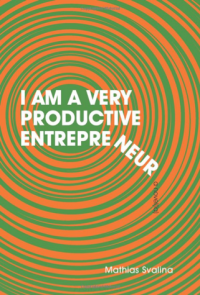 I Am A Very Productive Entrepreneur
I Am A Very Productive Entrepreneur
by Mathias Svalina
Mud Luscious Press, 2011
67 pages / $12.00 Buy from Mud Luscious Press
Rating: 8.0
Mathias Svalina’s I Am A Very Productive Entrepreneur has a very simple conceit: in a series of vignettes, an entrepreneur describes the outlandish businesses he’s started, and, occasionally, their reasons for not working. Thus, we learn of enterprises to turn everything into gold, to put blond hairs on the pillows of single men, to allow children to remain children forever, to retrofit memories with pilot lights and to slip old notes inside of used books by invisible employees.
Though these businesses tend towards the absurd and the impossible, Svalina mirrors and/or mimics our late capitalist culture and its marketing of the intangible. In one chapter, the entrepreneur, who ”lives off ideas,” proposes a business that doesn’t feed the hungry but rather shows the hungry pictures of food. The problem, according to the entrepreneur, is not hunger itself but rather the idea of hunger and of communication. We thus move away from the concrete towards its virtualization, its representation. Sadly, in the world, this sort of scheme doesn’t solve any problems – though it does, in the fiction, get the entrepreneur laid.
Svalina’s sinister critique continues with a business akin to the Situationist derivé, where the entrepreneur’s team gives tours of neighborhoods to the people living there. The idea is that you can ”visit where you live for the first time” so you can discover something new in your daily existence (a theme common to many of the businesses). At first, the entrepreneur’s team plans to explain the history of the neighborhood to its residents but discovers that ”what people want is to have the tour guide state who lives in each house and what the house looks like.” That is, instead of a process of discovery or illumination (as this business and many of the other businesses aim at), the tours merely fulfill the desire to be seen.
And while some hope for relief is hidden in the tongue-in-cheek trivialization of the momentous, the mimicking of our culture and the commercialization of avant-garde practices, this very hope for relief (a glass of sugar water for parents of dead children, as one business would have it) seems to be unattainable; sadly, the aforementioned sugar water is never sweet enough.
With its short chapters and repetition of descriptions of businesses that all suggest a journey or realization or some hoped-for comfort, the book moves from one fantastic description to the other, mirroring, perhaps, the market’s demand for the next best thing. This, to be honest, spooked me when I was burning through the book. I was partaking in what the book seemed to be critiquing by hoping for more beauty. Suddenly, reading it made me feel weird. It all felt so worthless. But then, at second glance, I saw that old desire for communication, the hope to break through. Indeed, it was this very repetition which made this clear to me.
Svalina’s book, like all great humor, is at once incisive and heart-breaking.
Tags: I Am A Very Productive Entrepreneur, Mathias Svalina, mud luscious press

tinyurl.com/429zubp